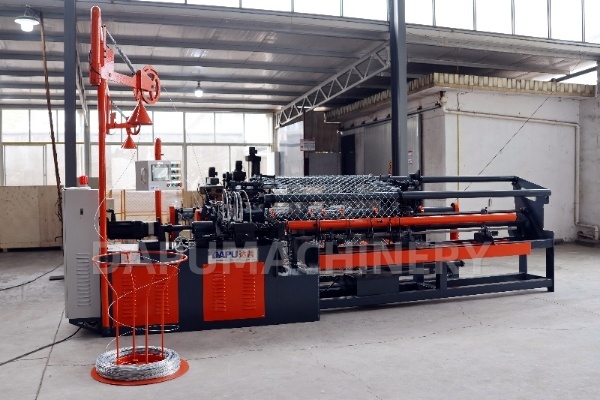
How Does a Chain Link Fencing Machine Work? Full Guide for Beginners
Category:News
Author:
Source:
Add time:2025-04-24 11:07
Chain link fencing is one of the most popular solutions for security, agriculture, and infrastructure projects worldwide. But how exactly are these durable wire meshes produced? In this guide, we’ll break down how a chain link fencing machine works, explore key challenges in emerging markets like South America, the Middle East, Southeast Asia, and Africa, and show how DAPU’s machines solve these problems with practical, cost-effective solutions.

How a Chain Link Fencing Machine Works
A chain link fencing machine automates the process of weaving metal wires into hexagonal (or diamond-shaped) mesh patterns. Here’s a simple step-by-step explanation:
Wire Feeding:
Coils of wire (galvanized steel, PVC-coated, etc.) are loaded onto the machine. The wire is straightened and fed into the weaving system.
Twisting & Weaving:
The machine uses rotating spools or hooks to twist the wires into interlocking loops, creating the chain link pattern.
Mesh Width Control:
Adjustable rollers determine the width of the mesh (e.g., 2m for garden fences or 4m for industrial sites).
Cutting & Rolling:
The finished mesh is cut to the desired length and rolled for easy transport.
Key Components:
Wire straightener: Removes bends for uniform weaving.
Twisting mechanism: Forms consistent loops.
Tension control: Ensures mesh stability.
Control panel: Adjusts speed, wire spacing, and length.
Top Challenges in Emerging Markets – And How DAPU Solves Them
Emerging markets face unique hurdles when producing chain link fencing. Below are common pain points and how DAPU’s machines address them:
1. South America: High Humidity & Corrosion
Problem: Coastal regions and rainforest climates accelerate rust, reducing fence lifespan.
Solution:
DAPU machines work with PVC-coated and galvanized wires (anti-rust).
Models like DP 20-100P support thicker wires (up to 4.5mm) for heavy-duty protection.
2. Middle East: Sandstorms & Extreme Heat
Problem: Dust clogs machinery, and high temperatures warp low-quality wires.
Solution:
Dual-motor systems (DP 20-100P) maintain steady speed even in 50°C heat.
Larger mesh openings (25–100mm) reduce wind resistance, preventing damage during sandstorms.
3. Southeast Asia: Frequent Rain & High Demand for Customization
Problem: Seasonal rains delay projects, while clients need varied mesh sizes for farms, fisheries, and construction.
Solution:
High-speed production: DAPU’s DP 20-100P makes 80–260㎡/hour, cutting production time by 50%.
Customizable settings: Adjust wire diameter (1.5–4.5mm) and mesh width (up to 6m) for shrimp farms, poultry cages, or highway fences.
4. Africa: Limited Electricity & Maintenance Skills
Problem: Unstable power and lack of technical support lead to downtime.
Solution:
Low power consumption: DAPU machines run on standard 220V power.
Simple design: Minimal moving parts (e.g., DP 25-85) reduce breakdowns. Training videos in local languages are provided.
DAPU Chain Link Machine Models – Built for Tough Conditions
DAPU offers three models tailored to different needs:
| Model | DP 25-85 (Single-Wire) | DP 20-100 (Dual-Wire) | DP 20-100P (Dual-Wire, Dual-Motor) |
|---|---|---|---|
| Wire Diameter | 1.8–4mm | 1.6–4mm | 1.5–4.5mm |
| Mesh Opening | 25–85mm | 25–100mm | 25–100mm |
| Max Mesh Width | 4m | 6m | 6m |
| Production Capacity | 120–180㎡/hour | 70–100㎡/hour | 80–260㎡/hour |
| Best For | Small farms, DIY projects | Medium factories, construction sites | Large-scale industrial use, harsh climates |
Why Beginners Love DAPU Machines
Easy to Operate
No advanced skills needed. The control panel uses simple buttons and dials.
Pre-set programs for common mesh sizes (e.g., 50mm for chicken coops).
Low Maintenance
Grease-free bearings and rust-resistant frames save long-term costs.
Spare parts (like wire guides) are affordable and globally shipped.
Adaptable to Local Materials
Use locally available wires (even recycled steel) to reduce costs.
Quick ROI
A DP 25-85 machine costs ~50,000 worth of fencing annually.
Real-World Success Stories
Nigeria: A Lagos fencing company used DP 20-100P to supply 10km of highway barriers in 3 weeks, beating manual competitors.
Vietnam: A shrimp farm doubled production with corrosion-resistant PVC mesh made on a DP 25-85.
Peru: A mining site reduced theft by 80% using DAPU’s heavy-duty 4.5mm wire fences.
Maintenance Tips for Longevity
Clean dust/debris from rollers daily (critical for desert areas).
Lubricate twisting hooks weekly with standard machine oil.
Store unused wire in dry conditions to prevent jams.
Conclusion: Start Small, Grow Big
Whether you’re a farmer in Kenya, a contractor in Brazil, or a security firm in Saudi Arabia, DAPU’s chain link machines offer reliable, scalable solutions. With models ranging from basic (DP 25-85) to industrial (DP 20-100P), you can start with a $15,000 investment and expand as demand grows.
Recommend News




